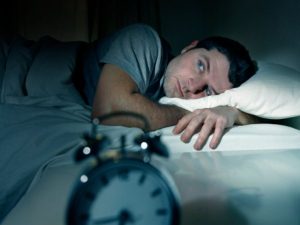 Dyssomnia refers to a broad classification of sleep disorders that involve difficulty getting to sleep, remaining asleep, or suffering from excessive feelings of sleepiness due to reduced quantity, quality, or amount of sleep they are getting. These conditions are likely the cause of extrinsic or external factors that disturb a person’s sleep, like excessive noise during sleep hours. Or it could be due to intrinsic or internal factors, such as circadian-rhythm sleep disorders preventing the body from obtaining restful sleep.
Dyssomnia refers to a broad classification of sleep disorders that involve difficulty getting to sleep, remaining asleep, or suffering from excessive feelings of sleepiness due to reduced quantity, quality, or amount of sleep they are getting. These conditions are likely the cause of extrinsic or external factors that disturb a person’s sleep, like excessive noise during sleep hours. Or it could be due to intrinsic or internal factors, such as circadian-rhythm sleep disorders preventing the body from obtaining restful sleep.
Complaints from affected individuals may include intermittent wakefulness during the night, early morning awakenings, or a combination of the two.
Advertisement
Common factors include caffeine, physical discomfort, daytime napping, and early bedtimes.
Types of dyssomnia
Intrinsic and extrinsic dyssomnia sleep disorders include:
Intrinsic:
- Insomnia
- Central sleep apnea
- Narcolepsy
- Restless legs syndrome
- Periodic limb movement disorder
- Hypersomnia
- Idiopathic hypersomnia
Extrinsic:
- Altitude insomnia
- Substance abuse insomnia
- Sleep-onset association disorder
- Environmental sleep disorder
- Limit-setting sleep disorder
- Inadequate sleep hygiene
What causes dyssomnia?
Those affected by intrinsic forms of dyssomnia often don’t have any underlying psychiatric disease. Instead, their particular sleep problems result in an associated decrease of functioning during times of wakefulness. This concern with not getting enough sleep often induces tension, stress, and leads to more sleep prevention.
It is possible that extrinsic factors or external stressors preventing sleep may present first, leading to several nights of unsatisfactory sleep. This may then induce the fear that other sleepless nights will follow.
Particular causes of dyssomnia may be associated with:
- Not getting enough bright-light exposure during waking hours
- Wake-sleep pattern disturbances
- Aging
- Overactive thyroid
- Alcoholism or abruptly stopping alcohol after long-term use
- Side effect of a new medication
- Excessive physical or intellectual stimulation at bedtime
- Jet lag
- Abruptly stopping a medication
- Nicotine, alcohol, caffeine, food, or stimulants at bedtime
- Excessive sleep during the day
- Worry, anxiety, or stress
- Depression or major depression
Symptoms of dyssomnia
Dyssomnia symptoms will depend on the underlying cause of each particular form. Nevertheless, symptoms of dyssomnia may include:
- Problems waking up in the morning
- Problems staying away during the day
- Drowsiness
- Frequent napping
- Fatigue
- Sleepiness throughout the day
- Sudden onset of sleepiness
- Feeling irritable
- Increased appetite
- Weight gain
Diagnosis of dyssomnia
Doctors will first obtain a detailed history of your symptoms and the symptoms of your sleep disturbance. This will include a sleep history including onset, frequency, and duration of sleep. Lifestyle habits will also be assessed to determine if substance abuse is a causative factor. Additionally, any physical manifestation as a result of your lack of sleep will also be documented, like headaches or weight gain.
Your doctor may also look deeper for the possibility of mental illness and psychological factors leading to sleep problems. Possible other health-related reasons, including disorders of the nervous, cardiovascular, respiratory, rheumatoid, or endocrine systems will also be ruled out.
Treating and preventing dyssomnia
The identification of the cause will allow for appropriate dyssomnia treatment. This involves treating any possible medical disorders, psychiatric disorders, and eliminating any possible stressors, such as alcohol and drug abuse.
Conservative forms of treatment are often the first to be employed before the use of any type of sleep aid medication. This may include psychological treatment techniques that include discussing sleep hygiene and ways to improve sleep. Cognitive behavior therapy may also be employed.
Advertisement
If conservative measures are not producing the desired results, your doctor may feel it necessary to prescribe medication. This may include the use of melatonin to alter sleep cycles or other drugs that help you maintain alertness during waking hours.
Prevention of more benign cases of sleep dyssomnia will involve the practice of good sleep habits. It is recommended to avoid bright screens at least 30 minutes before going to bed. This includes TVs, computers, and your cell phone. This is because modern screens today give off “blue light,” which can trick the brain to think your eyes are seeing sunlight, when it may be pitch dark outside. In effect, your natural circadian rhythm and melatonin levels may become unbalanced, causing you to have trouble falling asleep.
Additional tips for good sleep habits include taking an evening bath, having a nice cup of caffeine-free tea, or even having a light snack that is high in protein to keep you from suffering from hunger pangs during the night.
[adstoappear]